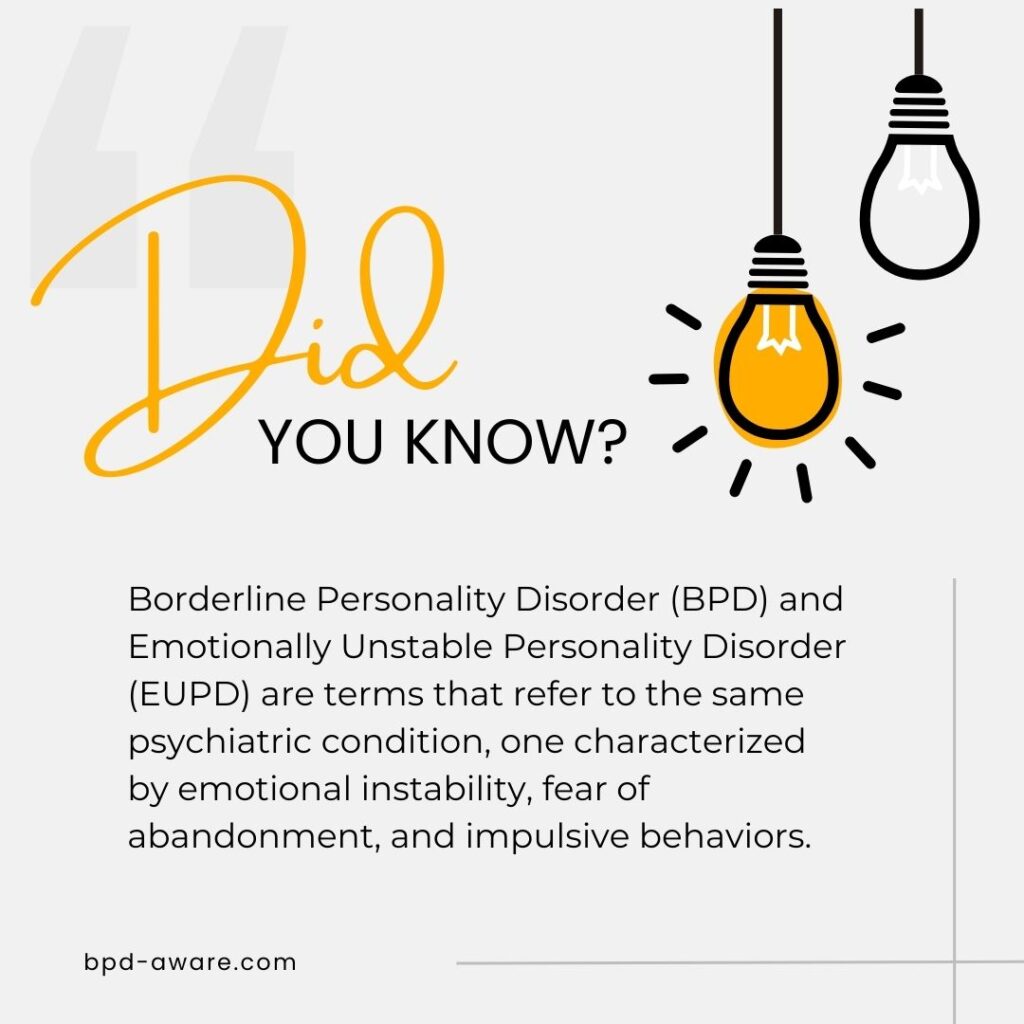EUPD stands for Emotionally Unstable Personality Disorder, which is more commonly known as Borderline Personality Disorder (BPD) in many countries. It’s a mental health disorder characterized by a pattern of unstable moods, thoughts, self-image, and behavior. These symptoms often lead to impulsive actions and problematic relationships. Individuals with EUPD may experience abandonment fears, feelings of emptiness, intense episodes of anger, depression, and anxiety that can last from a few hours to days. Treatment typically involves therapy and, in many cases, medications. It’s important to approach this condition with professional help, as it can be complex to manage.
Why do People use the Term EUPD Instead of BPD?
The term EUPD is sometimes used by some people instead of BPD for several reasons:
- Reducing Stigma: “Borderline” can carry negative connotations and may be perceived as stigmatizing. The term “emotionally unstable” is thought by some to be more descriptive of the symptoms and less pejorative.
- Descriptive Clarity: Emotionally Unstable Personality Disorder more directly describes the condition’s primary symptoms — emotional instability and impulsivity. This can help in understanding the disorder better.
- Diagnostic Practices: Different regions or mental health systems may favor one term over the other. For instance, the term EUPD is more commonly used in the United Kingdom, reflecting the language in the International Classification of Diseases (ICD), whereas BPD is the term used in the Diagnostic and Statistical Manual of Mental Disorders (DSM), mainly used in the United States.
- Patient Preference: Some patients may prefer one term over the other based on their personal experiences and feelings about the labels.
- Clinical Distinction: In some contexts, EUPD is used to describe a broader range of symptoms than BPD, potentially encompassing other forms of personality disorders characterized by emotional instability.
The preference for one term over the other can vary greatly among individuals, clinicians, and regions, reflecting the evolving understanding and approach to mental health disorders.

Is It Wrong To Use The Term BPD or EUPD?
Using the term BPD or Borderline Personality Disorder instead of EUPD or Emotionally Unstable Personality Disorder is not inherently wrong. The choice between these terms often depends on several factors, including regional practices, clinical context, and personal preferences.
If you are someone who has been diagnosed with BPD/EUPD, you can use whichever one you prefer or use them both interchangeably depending on the context. If you know someone who has been diagnosed with BPD/EUPD then please use the term they are most comfortable with when discussing their condition with them, this shows empathy and understanding.
Are There Any Other Names For BPD/EUPD?
There are no other medically recognized terms for BPD/EUPD, as of writing.
Historically, the term “borderline” (without the addition of “personality disorder”) was used because it was thought the condition was on the “borderline” between neurosis and psychosis. “Borderline” is now largely outdated and not used in clinical practice.
There is some support within the BPD/EUPD community for the name Emotional Intensity Disorder as a fairer description of disorder with the belief being that both “borderline” and “emotionally unstable” carry a certain amount of stigma that is undesirable.
Final Thoughts
In conclusion, Borderline Personality Disorder (BPD) and Emotionally Unstable Personality Disorder (EUPD) are terms that refer to the same psychiatric condition, characterized by emotional instability, intense interpersonal relationships, and impulsive behaviors. The choice between using BPD or EUPD largely depends on regional clinical practices. BPD is more prevalent in DSM-oriented regions like the United States, and EUPD is used in ICD-oriented regions, particularly in Europe.
However, beyond these geographical and clinical preferences, the choice of terminology can also be deeply personal and subjective. For some, the term BPD may resonate more, perhaps due to its longer history and presence in psychiatric literature. For others, EUPD might seem less stigmatizing and more descriptive of the condition’s key symptoms. This personal preference is crucial in the discourse surrounding the disorder, as it respects the perspectives and experiences of those living with it.
Ultimately, whether one uses BPD or EUPD, it’s vital to remember that the name does not change the nature of the disorder. Both terms describe a complex and challenging personality disorder that requires empathy, compassion, and effective treatment. The ongoing conversation about its nomenclature reflects the evolving understanding of mental health and the continuous effort to destigmatize and accurately represent psychiatric conditions. As awareness and knowledge about this disorder grow, so too will the sensitivity and appropriateness of the terms we use to describe it.
Sources, Resources, and Further Reading
- Referral of patients with emotionally unstable personality disorder for specialist psychological therapy: why, when and how?: https://pmc.ncbi.nlm.nih.gov/articles/PMC8058872/
- What Does the Term ‘Emotionally Unstable’ Mean?: https://www.verywellmind.com/what-does-the-term-emotionally-unstable-mean-5271082
- ‘I don’t see EUPD; I see you and your situation’: https://www.bps.org.uk/psychologist/i-dont-see-eupd-i-see-you-and-your-situation
















